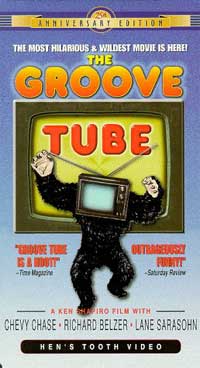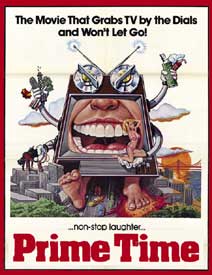 A satire on television, Prime Time; aka, American Raspberry (1976) manages to mix a bit of science fiction with a completely amateur take on sketch comedy, imitating in an inferior manner the at-the-time fresh & popular Saturday Night Live. A satire on television, Prime Time; aka, American Raspberry (1976) manages to mix a bit of science fiction with a completely amateur take on sketch comedy, imitating in an inferior manner the at-the-time fresh & popular Saturday Night Live.
Congressman Simon was murdered live on television. But it turns out there was no such person. Someone has found a method of interferring with & altering television waves.
Stan Dawn, on anti-erection medication that causes farting, is the best example of the film's level of humor. Some of the "sketches" are only a half minute long & come in swift succession, just about never invoking the tiniest smile, & rushing to the next unfunny bit too swiftly for the viewer to think about how dumb each bit might be.
Redneck hunters have been liscensed as snipers permitted to shook their limit of students from campus towers. Jacques Cousteau searches for Jimmy Hoffa. A forest ranger & his hunting-midget, who likes to hump legs, find a Lost Tribe of men without women, called the Woodfuckers. The Supreme Court decides abortions are legal through age five. A nazi uses American Express. Negroes are re-enslaved as a new source of pollution-free energy.
The takeover of the airwaves is for no other purpose but bad shtick that even Laugh-in wouldn't've used. And it's got the government scared schtickless.
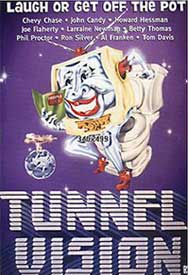 Tunnel Vision (1976) from some of the same lame filmmakers isn't quite as bad as Prime Time & works very slightly better as a satire on the television age, interesting mostly for some "exaggerations" of television culture which have since come to pass. Tunnel Vision (1976) from some of the same lame filmmakers isn't quite as bad as Prime Time & works very slightly better as a satire on the television age, interesting mostly for some "exaggerations" of television culture which have since come to pass.
An uncensored network has been choreographing the news, supporting revolutionary organizations in exchange for exclusive coverage rights. The story unfolds in the context of sketch comedy posing as the world's stupidest television programming, while a government committee busies itself investigating the out of control station.
There's a sitcom about vulgar incestuous gypsies, a music program which permits the audience to beat rock performers nearly to death because the music has a "beat" get it ha ha, an instructional film "How to Be Butch," a game show where people dress up as ridiculously as possible & reveal their criminal activities, an alternate world version of Charlie's Angels with Charles Manson on the phone talking to the girls.
Also included are spoofs of commercials anyone watching tv in the early 1970s might find worth a giggle, but others too young to remember the original versions probably won't find the spoofs as good. The faux commercials are of a higher quality than the film per se & seem to have been directed by a whole other talent than made the bulk of this poor film.
There's a big cast of never-to-be-seen-again comedians but now & then you'll spot someone who later became famous, including Chevy Chase, Al Franken, Ron Silver, Phil Proctor, Howard Hessmen, & John Candy, most of whom are lost in a huge cast that amounts to a parade of cameos.
The failure of Tunnel Vision is unfortunate because there's quite a lot "almost cerebral" about it, incidental social commentary with the same intent as the old That Was the Week that Was or the new The Daily Show except just not funny.
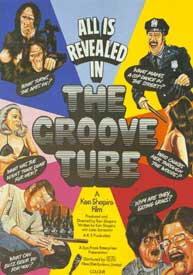 To an enormous degree, the those two bad sketch comedy anthologies aimed at savaging television were inspired by the legitimately funny The Groove Tube (1974) which does brilliantly what the imitators did poorly. Even the enormous amount of lowbrow scatalogical humor is hilarious. To an enormous degree, the those two bad sketch comedy anthologies aimed at savaging television were inspired by the legitimately funny The Groove Tube (1974) which does brilliantly what the imitators did poorly. Even the enormous amount of lowbrow scatalogical humor is hilarious.
Groove Tube was an end-product or extension of Channel One Video Theater in New York out of which came a few of the earliest Saturday Night Live writers & performers, including Chevy Chase & Richard Beltzer, way back when he was actually capable of being funny, orchestrated by Ken Shapiro, at the height of his own powers as comedien & comic writer.
Shapiro's humor was so similar to that which made the early years of Saturday Night Live "hip" that it's a wonder Lorne Michaels didn't make Ken part of the series.
You might recognize one of Ken's bits in Groove Tube (he's a newscaster left uncomfortably on the air when the news is over) as a bit given to Chevy Chase on Saturday Night Live. Ken's closing dance routine down New York city streets is just so like John Belushi, & his & Beltzer's long skit on drug dealers, while not the funniest thing in Groove Tube, harbors the seed of the Blues Brothers. So why isn't Ken as well remembered today as the many he nurtured or inspired?
It appears that Shapiro believed he was going to become a wheeler-dealer big-wig in the movie industry & snubbed television sketch writing, so after defining a type of comedy that would remain the hippest of the hip for the rest of the decade, he went Hollywood in order to fail as a producer-director. As point of fact Shapiro hired Lorne Michaels in 1975 as a writer for the intended cinema successes to come. Had all these plans worked out in Shapiro's favor, Saturday Night Live might not have come into being at all, as Lorne would've been his flunky in Hollywood.
So Ken's The Groove Tube for better or worse is the best record of the great comic he once was, & of the style of comedy he established as the norm for the rest of the '70s. It's hard today to understand how influential this film was among youth. Insofar as it reflects an urban youth culture of the time, some of the humor may well have faded in its impact, especially the drug-related humor of the the Cheech & Chong parody, & the free-love hippy humor of the horny streakers in the forest, bits that fall flat today but had momentary relevance in their day.
Yet percentage wise a whole lot of Groove Tube is still funny even if no longer as daring as it once seemed. It begins with a parody of 2001: A Space Odyssey only instead of a monolith, the hairy ape-tribe finds a television, & thus is civilization born.
Chevy Chase singing "Tea for Two" while while Ken uses his head for a bongo is mere silliness & well worth a smile. Safety Sam the talking penis giving a lecture on venereal disease is bust-a-gut funny. The looniest cooking show of all time brought to you by Easy-Lube Shortening mesmerizes with its wonderful asburdity.
Ken as Koko the Clown starts out as an annoying kiddy program such as would chase anyone above the age of eight out of the room while the kiddies are rivetted to the screen. But when the parents are all forced out of the room, Koko takes off his silly red nose & sits down calmly to read chapters of Victorian porn or the Marquis de Sade requested by his young viewership. This bit alone is worth renting Groove Tube.
The Uranus Corporation Ads show what science can do for you, & though the GM ads being spoofed are long forgotten, Uranus ads are still pretty damned funny. By the time this film pulls up to Ken Shapiro's manic dance through New York at rush hour, anyone should be convinced he was a gifted lunatic.
In our day & age with entertainment from the "Jackass" crew or Howard Stern, a lot of the lowbrow bits of Groove Tube can no longer shock or offend. But the almost cerebral satiric moments still work, & show how the combination of social awareness & slapstick such as defined Saturday Night Live started one year earlier with Groove Tube.
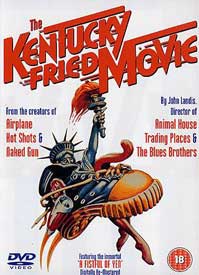 Shapiro's The Groove Tube was a maximum cult favorite in its day & very influential among stand-up comics & among filmmakers & likely even an influence on Monty Python's sketch comedy films. Its nostalgia appeal, & its '70s referentiality, will make it most appealing for viewers who themselves remember the 70s, though I think most of it should be accessible to newer generations of viewers. Shapiro's The Groove Tube was a maximum cult favorite in its day & very influential among stand-up comics & among filmmakers & likely even an influence on Monty Python's sketch comedy films. Its nostalgia appeal, & its '70s referentiality, will make it most appealing for viewers who themselves remember the 70s, though I think most of it should be accessible to newer generations of viewers.
There were imitations of Shapiro's films throughout the 70s & into the 80s, as it had been the basis of a semi-live multi-media performance theater in New York which inspired entertainers & artists of all stripe at a critical time in entertainment history, & fed talent not only into Saturday Night Live but also into low-budget sketch-comedy-oriented films that became a veritable genre of their own.
Most such imitations, such as Prime Time & Tunnel Vision, couldn't hold a candle to the original. But one of the high points of this comedy sub-genre was Kentucky Fried Movie (1977) which includes the spectacular Bruce Lee parody, a short film unto itself, A Fistful of Yen.
John Landis & his writers Jim Abrams & the Zucker Brothers owe Shapiro an enormous debt of gratitude not only for the form of Kentucky Fried Movie but some of the tone & attitude of his comic masterpiece with John Belushi, The Blues Brothers. The Zucker Brothers would go their own route with film parodies beginning with Airplane! (1980) but would always carry a bit of Shapiro with them.
If A Fistful of Yen had been the only moment of exellence Kentucky Fried would be forever worth viewing.
Not much of the rest rises to that level, admittedly, & the hip context of Shapiro's lowbrow moments are just needless nudity & crudities in Landis's hands. Still, there's something to be said for Henry Gibson's pitch for donations to "the United Appeal for the Dead" because death remains the number one killer in America.
"That's Armegeddon" spoofs the disaster films of the decade; there's a fine Wizard of Oz spoof & the marvelously tasteless "Danger Seekers." "Catholic School Girls in Trouble" spoofs porn & was inspired by "Sex Olympics" from Groove Tube. The "Eyewitness News" skit likewise imitates Shapiro's "Sex Olympics."
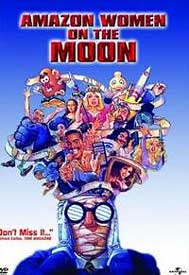 Though Kentucky Fried Movie spoofs movies more than television, it's still Groove Tube at heart, & includes spoofs of television commercials that remained de rigour after Groove Tube. Though Kentucky Fried Movie spoofs movies more than television, it's still Groove Tube at heart, & includes spoofs of television commercials that remained de rigour after Groove Tube.
Kentucky Fried Movie would remain the high point of the sketch parody cycle of films begun by Shapiro, such as would eventually lose their commercial appeal in the new decade, not really revived until the Scary Movie horror comedies which owe much to Shapiro through Zucker & Abrams.
But before Scary Movie there was one last hurrah for the original cycle of sketch comedy spoofs, Amazon Women on the Moon (1986), each segment a stand-alone short subject from a different director.
Although it wasn't the equal of Kentucky Fried Movie, with too few laughs, it did include the single best parody encountered in the whole history of these sketch movies, the only piece to at least equal & probably surpass Fistful of Yen.
That's the wonderful Son of the Invisible Man directed by Joe Dante as an homage to the original black & white film, chornicling the exploits of a chap who only thinks he's invisible & can't be convinced otherwise.
It's played totally straight as the mummy-wrapped Invisible Man (Ed Begley, Jr.) explains his horrible plight to his best friend. He then begins to unwrap his head & undress until he's standing there in the altogether refusing to hear his friend's assurance that he's perfectly visible.
The Son of the Invisible Man then strides naked into the local village & enters a pub where he commits sundry pranks only an invisible man could commit, while the local lads role their eyes & remark to one another sarcastically, "I wonder how that could've happened."
The physical beauty of Dante's contribution is that it really does look like a vintage film & comical though it is, it's also a loving homage to the thing it spoofs.
Nothing else in Amazon Women on the Moon comes near it, & some of it, like the Video Pirates who are actual harrrrr pirates couldn't possibly be mistaken for funny. But there's something to be said for Henry Silva's pokerfaced performance in Bullshit -- or not? trying to prove the Titanic never existed, or that the Loch Nes Monster was one & the same with Jack the Ripper.
The recurring play off B sci-fi films will also delight fans of B sci-fi, even though as the humor goes, some of the films being spoofed were funnier for not being intentionally funny. The fact that the sci-fi spoof was designed to look dated & hoky means, ironically enough, that as the spoof itself ages, it does not itself date too much, though for myself that only means it's as unfunny today as it was in 1987.
Another running gag places television addict Murray (Lou Jacobi) in his television set after having pointed the remote control at his head. He'd like to stay in the Playboy Channel, but now that his wife has control of the remote, he can't make his own choices.
The pitch for donations for the "Blacks Without Soul Foundation" & other spoofy ads are often very funny. So too the uneducational educational films are worth a smile, like the hair-club spoof showing bald guys how to have an actual carpet stapled to the head. Shapiro's original Groove Tube is perhaps at long last fading as a primary inspiration, with Amazon Women of the Moon being a little more Monty Pythonesque.
copyright © by Paghat the Ratgirl
|
